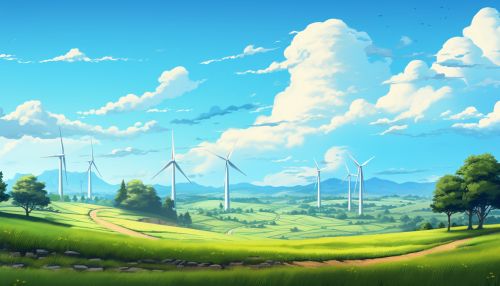Renewable energy sources
Introduction
Renewable energy sources are forms of energy that are replenished naturally in a relatively short period of time. These include energy from water, wind, the sun, geothermal sources, and biological sources. Renewable energy sources are considered to be an important part of a sustainable future, as they do not deplete natural resources or contribute to climate change to the extent that traditional fossil fuels do.


Types of Renewable Energy
Solar Energy
Solar energy is energy harnessed from the sun. This is done either through the use of photovoltaic cells in panels to create electricity, or through solar thermal collectors that absorb the sun's heat energy for heating or electricity generation. Solar energy is a clean, abundant, and increasingly cost-competitive form of renewable energy.
Wind Energy
Wind energy is generated by converting the kinetic energy of wind into mechanical energy or electricity. This is typically done using wind turbines. Wind energy is a clean and renewable source of energy that has been utilized by humans for centuries.
Hydropower
Hydropower is energy derived from the movement of water. This can be from the flow of water in rivers, or from the movement of tides and waves in the ocean. Hydropower is a versatile and flexible source of renewable energy, as the flow of water can be stored and used when needed.
Bioenergy
Bioenergy is energy derived from biological sources - these can be plants, wood, waste, or alcohol fuels. Bioenergy can be used for heating, electricity generation, or as a transport fuel. While bioenergy can be a renewable source of energy, it is important to manage it sustainably to avoid negative impacts on food security or biodiversity.
Geothermal Energy
Geothermal energy is energy derived from the heat within the earth. This heat can be harnessed for heating and electricity generation. Geothermal energy is a reliable and constant source of energy, as it is not dependent on weather conditions like solar and wind energy.
Advantages and Disadvantages of Renewable Energy
While renewable energy sources have many advantages, such as being environmentally friendly and sustainable, they also have some disadvantages. These include variability in supply (for wind and solar energy), potential environmental impacts (such as habitat disruption from wind turbines or hydropower dams), and the current higher cost of some forms of renewable energy compared to fossil fuels.
The Role of Renewable Energy in the Future
Renewable energy sources play a crucial role in the transition to a more sustainable and less carbon-intensive energy system. They are expected to make up a significant portion of the energy mix in the future, driven by declining costs, technological advancements, and policy support for renewable energy.
